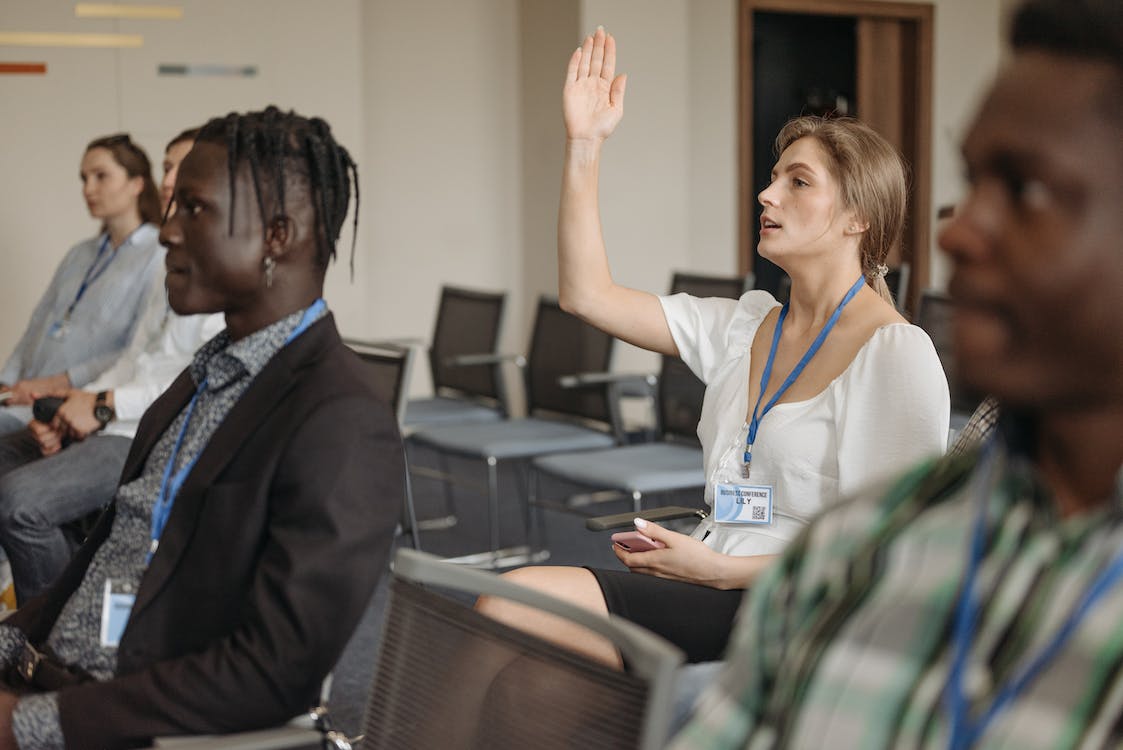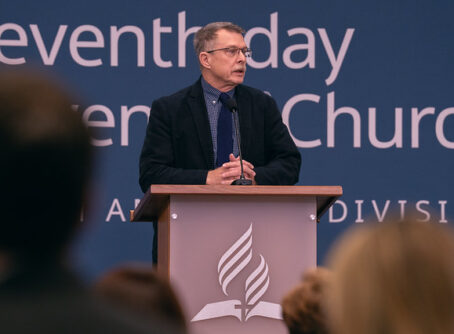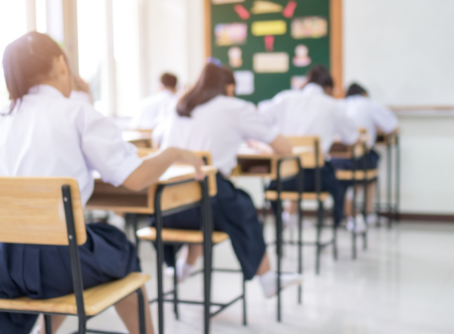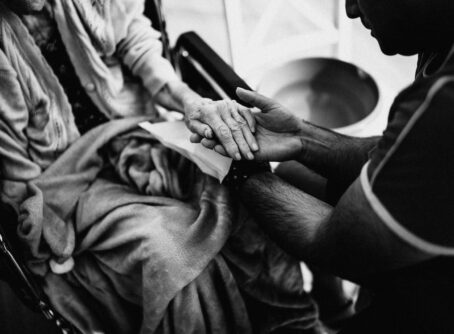
Welcome to the Academics Corner! CPJ’s ongoing series sharing the good work that Christian academics are doing to promote public justice from their research to the lecture hall.
RO: Could you tell us a little bit about your background and what motivated you to be involved in the social work world?
AF: I’ve always been interested in these issues, especially hunger, since I was a kid. I had some experience working with my grandma in food pantries and that experience got me thinking about social work early on. Then, when I was in college trying to determine what to do, I started in education, but dealing with little kids every day all day didn’t sound quite right to me. Then I learned more about social work, and was really intrigued by it. So I followed the path to get that degree in undergrad, and then worked for a little bit, and then went back to school again for a master’s degree in social work. I’ve always been interested in policy issues, as well as administrative and organizational matters. My master’s degree at the University of Michigan was focused on that. So it was communities and social systems, management, human services and that sort of thing.
After that, I worked as an intern for Bread for the World for a couple of years and did some work for them in their regional office in Ohio. I was doing organizing work on hunger and poverty issues, helping to equip college students and church groups around advocacy issues. So that was a great experience in the field. After I did that for a few years, I got a little tired of traveling, especially traveling a lot on the weekends. So I was looking around and trying to figure out what to do next. Then, I saw an opening at Dordt. So I came to teach here, where I also did my undergrad. Then, while I was teaching here, I got my doctorate in political science with a public administration emphasis. Throughout that process, I’ve always been interested in and known about CPJ. I like the approach to thinking about things from a pluralist perspective and the concept of public justice.
RO: Could you share a specific instance or project that stands out in your advocacy work related to hunger issues, and what impact it had?
AF: When I worked for Bread for the World at a time where there were a lot of conversations happening concerning things like global poverty, AIDS, and extreme hunger. Hence, the work that I did along with a team of about 8 or 9 other people was centered around a partnership called the ONE Campaign. We, as Bread for the World, really focused on helping to generate some interest in faith based communities. The idea was really a global campaign, targeting those Poverty Focus development programs that the US funds for others in other countries. There’s a general perception that the U.S. is giving so much money to all of these other countries to help them, when the numbers are actually less than one percent of our overall budget. So we did some teaching on that. Overall, it was a really exciting campaign to be a part of, and it had a number of big development and advocacy organizations in the United States that were a part of that and also some celebrities were as well. So it was fun to be a part of that, and to have a small part in that bigger campaign early. What was effective or helpful about that was seeing how these groups and organizations that had diverse missions and different perspectives came together around a specific campaign and specific tasks, and how they were able to navigate those differences to come together and advocate to elected officials and educate others to do the same thing as well.
In the last year, I’ve also been involved with the Iowa Hunger Coalition, really thinking about things at the State level, since things can be changed, obviously, through State legislation. The coalition is a group of individuals as well as organizations across the state that meet monthly. At these meetings, the leaders of Iowa Hunger often talk about what’s going on in the spring, which is the legislative session at the State level. There are often opportunities I have to speak into various things that they may be thinking about doing, so that’s been a good thing to be a part of as well and kind of highlights the the differences between what advocacy can look like at the federal level, and the state and more local levels as well, since there are differences in how you do that. The timeline and the ability to connect with people differ between the two as well.
RO: In your Dordt bio, you said that you have a special interest in looking at “how Christians and broader society have responded to the needs of vulnerable people.” You then go on to say that you studied how different parts of civil society have responded to those needs as well. Can you tell us a little bit about what this kind of research has yielded?
AF: Part of my work in my dissertation involved looking at contracts for service relationships. One of the things over the years that I have been interested in is that there seems to be this political rhetoric or dichotomy of either more government or less government. Yet, neither of those frameworks seem to actually reflect how things really work. So in social services what we see is, for example, if you have a nonprofit in your community that the people support and donate to, they usually do not think of that at all as having any sort of connection to the government. This is appropriate, they shouldn’t necessarily think that. However, many nonprofits have a relationship with the government because the government funds some aspect of their work. Typical social service provision types of organizations may have the private donations, connections to the community, and also a contract with the government to do some of the work that they do. And that’s been an interesting relationship to me. What I looked at in my dissertation work was “What is that like for service providers? What is their perception of that relationship? How do they view that governmental contractor?”
The idea of this contract mechanism is that you bid for it, receive the contract, and then you perform the services. So some questions around the arrangement are: “Is that actually competitive? If so, how?” So I asked some questions like that, and it was interesting to find that most of the service providers felt fairly confident that they would continue to be able to engage in this relationship with the government contractor. The other thing that I thought was interesting is that many of them viewed it as a partnership. So the government is declaring what the money’s for, and you have to use it for this, which is all appropriate. But the nonprofits didn’t think that the government was unjustly directing how the funds should be spent. That has been an interesting examination for me in terms of how that works and, I think, has shown how little we generally understand the complicated relationship between government and nonprofits in a lot of areas.
RO: What do you think are practical avenues in which civil society today can better address the needs of vulnerable people, such as the hungry, and families in need?
AF: I think one of the things that we need to keep in front of us is the idea of pluralism and the support of diverse actors, whether that’s an organization, a group of people, or a religious group. When they have that desire to respond to needs in their communities, they should legitimately feel free to do so in ways that are full of integrity towards their point of view and their beliefs. When you think about that government piece of it, there can always be that tendency of setting a monolithic standard of what it’s going to look like, and saying “It’s gonna look the same in all places.” There’s a lot of reasons why that seems appealing, but I think if we really want to have communities empowered and engaged in responding to the hungry in their community, for example, it has to be more organic than that. It should reflect who they are and be something close to what they know, what they want to do and how they want to approach a particular issue. That’s one of the things I love about what CPJ does. There’s something good and beneficial about how different communities express this response, and that is beautiful.
“I think one of the things that we need to keep in front of us is the idea of pluralism and the support of diverse actors, whether that’s an organization, a group of people, or a religious group. When they have that desire to respond to needs in their communities, they should legitimately feel free to do so in ways that are full of integrity towards their point of view and their beliefs.”
RO: How did your experience as a Faith Outreach Organizer for Bread for the World influenced your perspective on public justice, especially in the context of hunger and poverty?
AF: I really appreciated Bread’s approach of things from a Christian perspective first, and also being committed to working in a bipartisan manner. Especially with issues like hunger, it’s so easy to work with one party and just make sure they get into office to solve these issues. When I was working there, if they were going to introduce a piece of legislation, they had to have a co-sponsor from each party on it before they could go forward with it. That is difficult to do and increasingly so. But I think it’s good. It’s good work. I continue to say, “Look, hunger is a human issue, and we, as people and as people of faith especially, probably have to be able to respond to our neighbors, and we, we need to right. It’s our responsibility to do that.” There can be differing opinions on how exactly we get there. But can we not be somewhat united? How we respond to that definitely helped to inform my own approach. I’m not thinking about policies from a partisan lens. At least, I’m trying to resist doing that. I want to think more foundationally about something, and then, you know, seeing how it needs to work itself out that way.
“I’m not thinking about policies from a partisan lens. At least, I’m trying to resist doing that. I want to think more foundationally about something, and then, you know, seeing how it needs to work itself out that way.”
RO: Are there initiatives to this end that young people can be a part of? What would you say to young people who think it’s too soon to make a difference in these areas?
AF: I would suggest doing a few different things. One way would be to just start helping. Volunteer at a food pantry or something like that in your community. Here, for example, we’re near a sack pack program where they bundle up a bag of food for kids to bring home over the weekend. There’s lots of opportunities to do the basic actions that communicate “I’m helping at this moment to do these things.” Even when we’re young or maybe don’t have all that much extra cash, I think some of your time and your ability to give some time is valuable. I don’t ever want young people to think “it doesn’t matter, because I can’t write a check for $500” or something like that. There’s something about just being present, interacting with people and showing respect, care, and compassion to someone else.
But I would also suggest alongside that, think about some of those advocacy opportunities and start to learn about a policy area that may be of interest to you. I often tell my students: “you don’t have to know all the things about all the areas, but if you think you have a passion for this area, then head in that direction for now.” So if you’re interested in hunger, then you can find organizations like Bread for the World. There are many others as well at the State level, and other federal ones, too, or national ones, where you can just start to commit to learning about it, but also to commit to signing up to those spots where they say “Would you like to know about x or y ?” The opportunities come from starting in those directions. Afterward, the opportunities keep coming if you’re interested. For example, if you wanna start talking with elected officials. But that doesn’t have to be your first step. Just begin to move in a certain direction when you feel prompted. Maybe reach out to someone in an organization and talk with them a little bit. I think those are good ways to get started.
“I’m helping at this moment to do these things.” Even when we’re young or maybe don’t have all that much extra cash, I think some of your time and your ability to give some time is valuable. I don’t ever want young people to think “it doesn’t matter, because I can’t write a check for $500” or something like that. There’s something about just being present, interacting with people and showing respect, care, and compassion to someone else.”
RO: You’ve mentioned to us before that you are able to use some of CPJ’s resources in the classroom. Could you share with us what that looks like?
AF: Yeah. So one of the places that I use CPJ’s resources is in my policy classes. We spend some time learning about think tanks and policy organizations and what they do. We also look at their role in the overall process of policy making and adjustments, and so on. One of the things that I have done is use the Hatfield Prize reports, and I typically have some from a few different years. I’ll say “Okay, you read this, and tell me what you see here. How are they doing this? What are the behind the scenes of how they might have put together this report?” We also talk about their recommendations for change and advocacy. Then the students discuss what they learn about youth justice or SNAP benefits in this area, or whatever the issue is. One of the cool things about The Hatfield Prize is that then I get to say, “Well, these students are your age. They are the same as you. And look at what they did here. Isn’t that cool?” A few years ago, The Hatfield Prize topics really lined up well with some conversations around paid family leave and some things in Families Valued. I even gave them a link to one of the webinars. So sometimes it just works out really well to bring in some of the work that’s being done by CPJ.
In another class, we talk about our response to vulnerability. This class is called Church, State and Social Welfare. In a couple of different places we talk about justice and compassion or mercy, and how they differ from each other. So I use some of the framing that comes from CPJ about how we can respond in ways that are compassionate. But also there are other times where we should really focus more on the justice piece of that. So we likewise use that framing from CPJ. In that same class we also talk about religious freedom. We ask questions about how we respect differing religious beliefs on certain aspects of society. To help answer those questions, we use some of the IRFA material around religious freedom. This all depends on timing and what’s being debated among different parts of society. So in that sense, CPJ’s material It’s been very helpful over the years for that.
RO: How do you think CPJ’s materials have been helpful in creating a framework for students from which they can tackle issues such as, but not limited to, the needs of the vulnerable, for example?
AF: The materials help to guide the discussion away from becoming a quick partisan debate about an issue. So my students are required to be more foundational in their thinking , and I think that The Hatfield Prize reports, and a lot of the other things that come out of CPJ, require you to remove those partisan lenses and to really engage with the issue from a public justice perspective and I think that is incredibly helpful. In a lot of ways, it’s not where we typically start, even though we should. So I think that the materials help to bring you right to the basics to begin with, and then you can flesh it out when you grasp what the thing is in its most essential form, and what should be right, thinking about what ought to be. Then you can work out of that rather than coming from it where you’ve already determined what ought to be.
Dr. Abby Foreman is a Professor of Social Work, Director of the Master of Public Administration program, and Dean of the Social Sciences at Dordt University in Sioux Center, IA. She has served as a faculty mentor for a Hatfield Prize recipient and is a long time fan of the work of the CPJ. She volunteers at her church and with hunger related causes in her community, and lives in Maurice, IA with her husband and three children.
Rafa Oliveira is the current Program Assistant for Shared Justice. He is a recent graduate of the King’s College in New York City with a degree in Politics, Philosophy, and Economics (PPE). He is originally from Brazil, but grew up in Southern Africa, and is an ardent Manchester United supporter.





